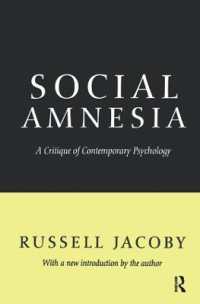- ホーム
- > 洋書
- > 英文書
- > Philosophy
Full Description
Addressing Heidegger's continuing centrality to continental thought, Markus Weidler argues that Heidegger's prickly charm is best explained in terms of his great ingenuity, crafting a novel genre of writing which promises to harness the revelatory power of artworks for the purpose of philosophical inquiry. In doing so, Heidegger challenges the reader with a provocative form of artisan thinking, which for Weidler is central to understanding the significance of Heidegger's work overall.
In Vorträge und Aufsätze (Public Lectures and Essays) Heidegger declares: 'once it has become anthropology, philosophy perishes from metaphysics.' Remarks critical of 'philosophical anthropology' are scattered throughout his writings, but so far commentators have not connected these tantalizing statements in any systematic way. This book deals with his hostility by addressing what we are to make of Heidegger's frequent but elusive dismissals of philosophical anthropology as a field of study.
This examination of Heidegger's complex relation to philosophical anthropology traces how pioneering thinkers like Schelling and Schiller paved the way not only for Heidegger but also for some of his potential competitors, most notably Max Scheler and Georg Simmel. Weidler argues that confronting the puzzle over Heidegger's peculiar relation to philosophical anthropology is also one of the keys to explaining his popularity as a philosopher, which has endured despite revelations of his various personal and political failings.
Contents
Abbreviations
Introduction: The Decisive Decade from 1936 to 1946
PART I: Back to the 1780s
Chapter 1 Philosophical Anthropology:
Herder's Pantheism as a Subtext for Heidegger's First Schelling Lecture
Chapter 2 Revelation:
Heidegger's Second Schelling Lecture vis-à-vis Scheler and Simmel
Chapter 3 "The Origin of the Work of Art":
A Critique of Schiller Incognito and the Beginning of Artisan Thinking
PART II: Battleground Nietzsche
Chapter 4 Heidegger's Nietzsche Volumes:
Nihilism, Physiological Aesthetics, and Volitional Metaphysics
Chapter 5 Hegel and Nietzsche in Holzwege:
Religious Skepticism, Witnessing, and "Subjectity"
PART III: Poeticsat the "Zero Hour"
Chapter 6 "Why Poets?":
Cultural Rebirth and the Poetic Inception of Piety
Chapter 7 The Letter on Humanism:
Modulations of the German Poet in a Demonic Text
CODA: Being and Time as an "Old-fashioned" Book?
Chapter 8 Freedom for Death and Prussian Resolve
Conclusion: Faith and Fanaticism after Heidegger
Notes
Selected Bibliography
Index






